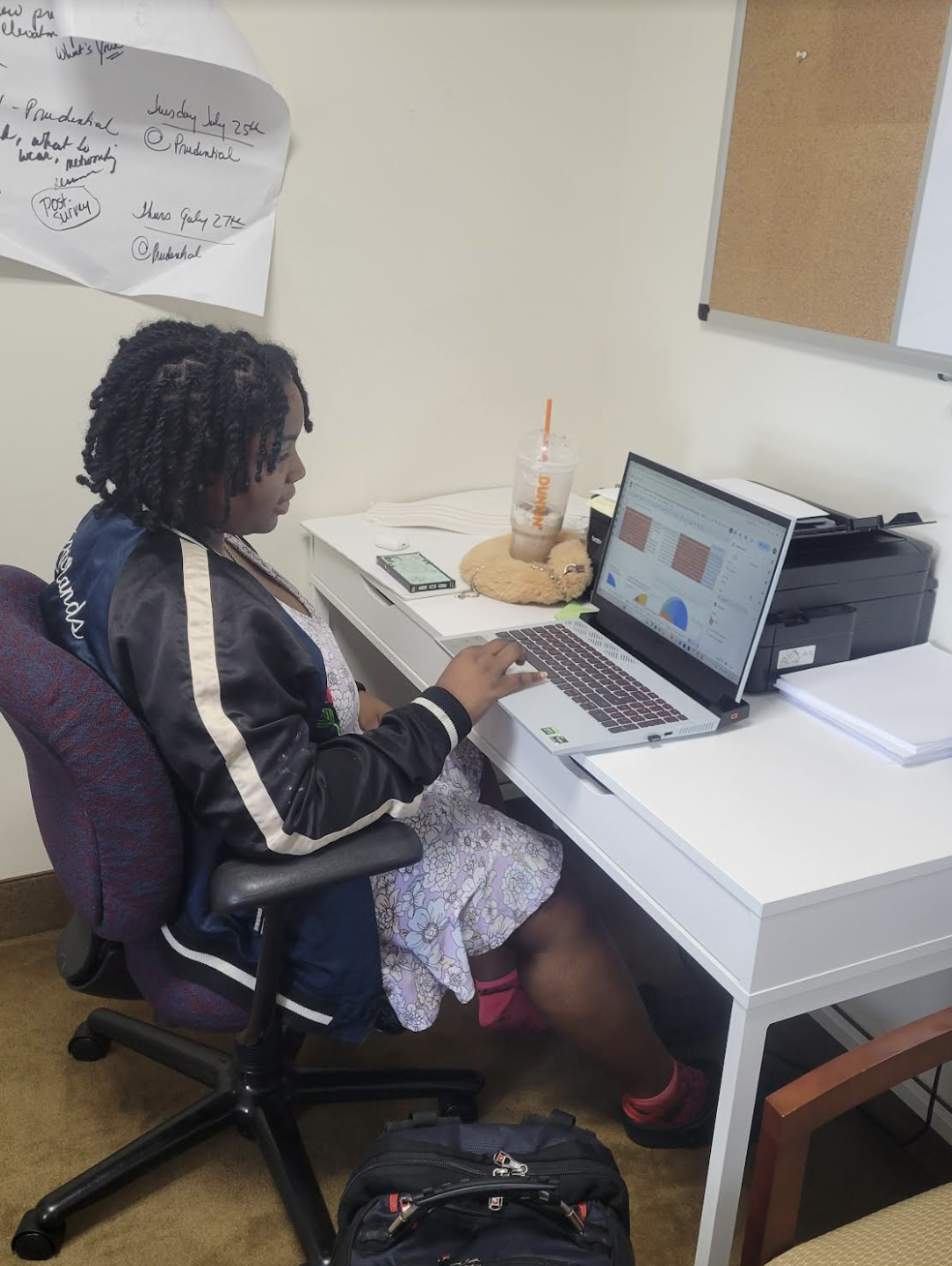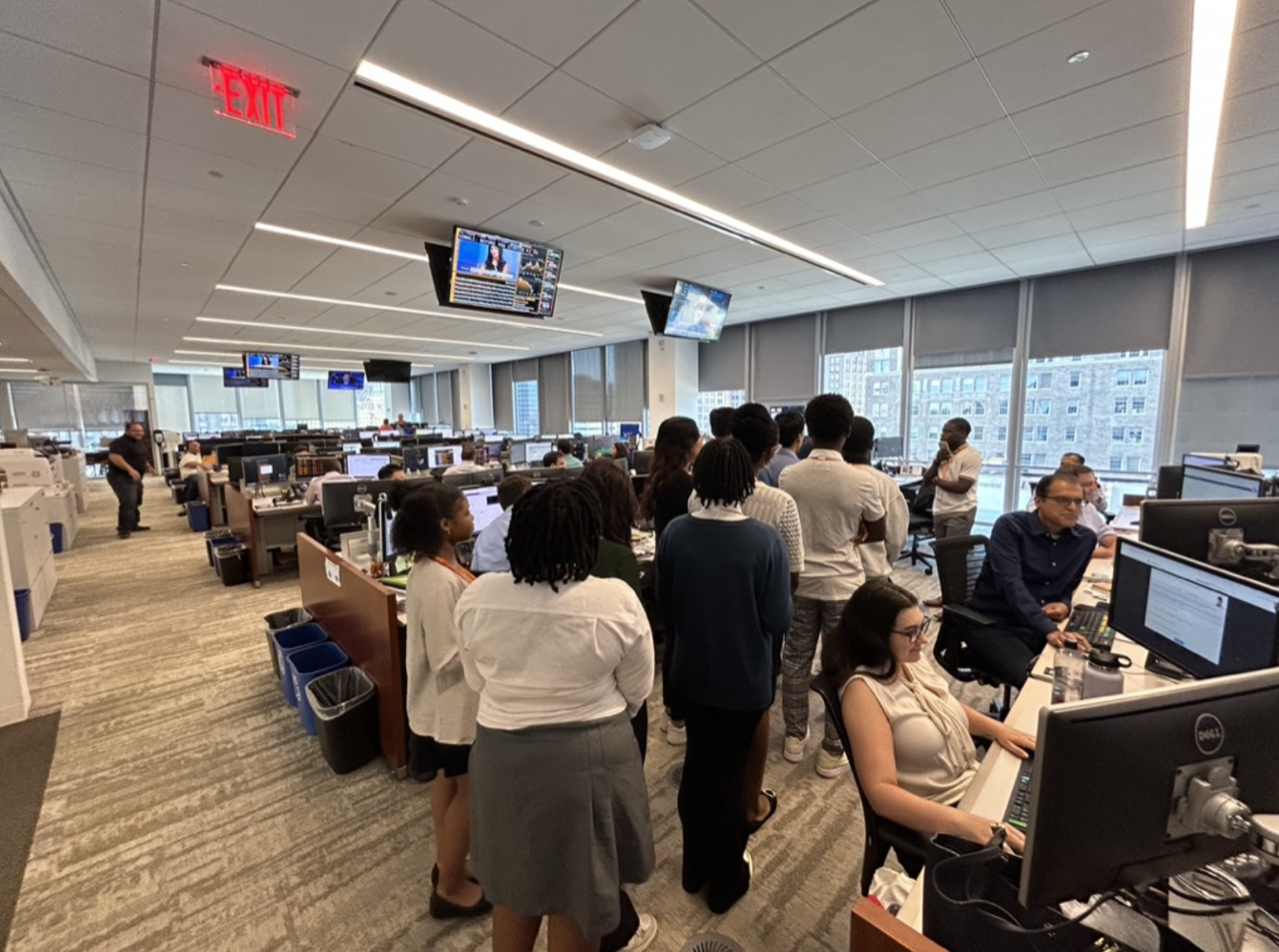
Jonnah Mann working in STC Newark’s office on data/impact reports.
Jonnah Mann is a senior at University High School in Newark, where she’s part of their law CTE Academy.
Gaining financial literacy is a vital step toward achieving stability and prosperity in one’s life. For me, this journey began with a mini college fair during a program that introduced us to various aspects of college life, including making financial decisions. This exposure has equipped me with the necessary knowledge and strategies to navigate various career paths, manage risks, and ultimately accomplish my financial objectives.
Empowered by financial literacy education, I now possess the confidence to embrace calculated risks, and strive for economic success on my own terms. In today’s ever-changing world, where financial decisions play a pivotal role in our lives, it is essential to equip students with the necessary knowledge and skills to make informed choices. As a strong advocate for financial literacy education, I have personally witnessed the transformational impact it can have on young minds.
Personal development through financial literacy
In my journey, I was fortunate enough to participate in a program called PGIM [Prudential Global Investment Management] Investment Early Career Exploration Program, also known as the PGIM PIECE Program. Not only was the program at Prudential, but it was in partnership with Schools That Can Newark, where I was able to take a hands-on learning financial literacy class.
This experience opened my eyes to the significance of financial literacy in shaping one’s personal development, especially as a first-generation student approaching the milestone of college. Through the program, I learned invaluable lessons about money management, including budgeting, saving, and investing. I became confident in tackling financial challenges that were previously unknown to me, such as understanding credit scores, effective debt management, and establishing an emergency fund.
Creating a foundation for a stronger future
The significance of financial literacy reaches far beyond immediate benefits. By instilling financial literacy at an early age, we lay the foundation for a stronger financial future. Students who graduate with financial knowledge are better prepared to handle and manage their personal finances, reducing the likelihood of falling into debt or making impulsive financial decisions. Ultimately, this empowers individuals to create a more stable and prosperous future for themselves and their families.
Awareness of opportunities and risk management
Financial literacy education has allowed me to identify and capitalize on diverse career paths and investment avenues. By developing into different investment vehicles and learning about risk management strategies, I have gained a comprehensive understanding of how to leverage financial resources effectively. This newfound knowledge equipped me with the confidence to make informed decisions and explore opportunities that align with my financial goals. Additionally, it has empowered me to assess risks more critically and develop methods to mitigate them, enabling a more secure and proactive approach to wealth creation.
Transforming perspectives
This all goes beyond learning facts and numbers—it profoundly influences our mindset towards money and fosters responsible financial habits. The program I participated in covered a wide range of topics, from navigating student loans to managing credit cards and understanding mortgages. I was able to develop into discussions on credit scores, debt management strategies, and the importance of building an emergency fund, I discovered the power of informed decision-making. I came to realize that personal finance is not just about grasping abstract concepts, but about actively applying that knowledge to shape a stable future.
A call for comprehensive financial literacy education
Based on my personal journey, I strongly advocate for comprehensive financial literacy education for individuals of all ages and backgrounds. Access to such education is key to breaking down the barriers that prevent many from achieving financial stability. By introducing financial literacy at an early age, we can empower individuals to develop responsible financial habits and make informed choices from the outset. This proactive approach will not only benefit individuals but also contribute to the economic well-being of our communities as a whole. 
Impacts on my future career and family
Everyday was a new story and new information for me to bring home. This opportunity gave me a chance to have a bond with my father about budgeting and saving money. My father and I took time throughout our day to create a budget before going to the store and write down the things we need for our home. We created an emergency fund just in case for safety and for unexpected events or moments.
Programs like this give me the opportunity to be able to know how to become financially stable and the difference between needing and wanting something for future purposes such as college, family, housing, retirement and so much more . Not only was I prepared for the end of high school and further beyond in life, but I was also able to work with STC Newark after the program. My experience and environment has been nothing but positive, friendly, and informational, and I was still able to learn as I proceeded. Being a part of this program gave me a little bit of insight on other careers I’d like to be a part of. I’m currently looking forward to other careers that fall in between the fields I’d love to be a part of someday.
In a world driven by financial choices, this educational curriculum is not just a necessity but a responsibility. It is time to prioritize financial literacy, ensuring that every student has the opportunity to thrive in this increasingly complex economic world we live in. With this deeper understanding of concepts like interest rates, debt management, and budgeting, I am now well-equipped to create a stable and comfortable financial future. I firmly believe programs such as the PGIM PIECE Program are not only necessary but also a fundamental component of personal, social, and educational well-being. It is clear that financial literacy is not only a personal asset but a social energy that paves the way for a more fortunate and financially strong future.

